#so its hard not to feel like a failure and the forgotten friend pr the one who only gets a call when someone needs something
Text
Recorded tonight's monologue with the line "loneliness and longing both taste like sea water, the problem is it starts in the lungs and by the time you can taste it it's too late you've already drowned." Safe to say lads we are not in fact stellar.
#spent the afternoon with pne of my childhood friends whose effectively my sibling she got married in may i was a groomsman#and she mentioned she and her husband were going to CT to spend new years with our other family friend jack and their family#with whom i coparent at times and who is the other nonbinary friend in the group etc#and i just said that sounded phenomenal i wish i had exciting new years plans maybe bew years 2024 we all do something together#and she calls jack unprompted to suggest my bf and i come up as well because she thinks that would make the holiday even better#and I'm in love with the idea but we realistically cant afford a hotel right now so we probably cant go#but my rejection dysphoria is fixating on the fact that she has cultivated the kind of relationship in which#concrete plans and invitations are made and i only get the 'youre always welcome we love you and can't wait to see you'#which if you have any neurodivergence you know isnt an invitation and is hilarious cause jack had as many issues as I do#so its hard not to feel like a failure and the forgotten friend pr the one who only gets a call when someone needs something#which isnt the truth but like goddamn at midnight it definitely seems that way
9 notes
·
View notes
Note
Harry as a weapon being taught to be human inbetween by Tenya and Teddy. Tenya who holds his hands and kisses his scars (forehead, hand, arm, all the scars he can find).
Class 1A seeing this broken pile of teens, who came from a war where nothing changed in the end. 1A who swears to make it right in their own world. (Not all do. Mineta is removed early after Harry uses his money to payback the donation the boy’s family made so the board wouldn’t fuss. Bakugou who sneers at everyone and won’t see the broken teens as anything but failures. Who fights for himself like another blond Harry remembers who had the same money and entitlement issues.)
Hizashi loving the nephew they never met until now. Who curses out Dumbledore with a bottle of scotch and the warmth of old friends around them.
Touya and Percy working together to rip down Endeavour. Aided by Molly who snarls her anger. She’s been unable to help Harry (in her darker dreams she wondered why she’d suddenly forgotten about the bars. Why it only came back when Dumbledore died. She was scared to know why she’d brushed it aside. She won’t let it happen again). Molly who storms Natsuo’s dorm to give him a sweater, who hugs Fuyumi. Who meets Rei with a smile (and a cloak borrowed from Harry. Rei goes missing three days later after a visit from her husband. Fleur just so happens to have her aunt visit after)
Arthur works with Nezu and flourishes. His mind and skill clicks with the small mammal who finds delight in these wizards. Arthur who discovers a boy forced to spy and opens his arms to the child. Who loves and accepts.
Geroge who finds hope in Tensei and later finds his own mark shining (only half because his twin was always part of him). Mount Lady who smiles and struts but who also has been trying more. Who saw a boy run in to save another while she did nothing and feels the sting. Who settles her shoulders, deciding she would fight back (who fights with Midnight as part of their PR but both go to a bar to bitch about it after) Mt Ldy who sees her soulmate, and decides to truly change to prove herself.
Neville who left a grandmother whom never saw him and a family who hurt him. Neville who finds his way as a UA student. As a leader.
UA is happy to open its doors as a magical school, Nezu cheerfully talking with Minerva who decided ‘fuck it’ when most of the children she cared about left. She followed after lighting Dumbledore’s portrait on fire.
Harry who forgot what it was not to be a freak or the Boy-Who-Lived. Even those closest to him turned him into a symbol in the end. A banner. He was the figurehead of their war and the man who was born to save them. Born to die for them. They try to understand but it’s hard to break six plus years of indoctrination. Harry can’t blame them for it. He’s having a hard time breaking it himself. It’s easier with Tenya being so far removed from the wizarding world. Who only sees Harry as his Soulmate rather than as a Symbol. He treats Harry so gently, so kindly, and pulls him back from that edge he was forced to walk so long. That he would still walk to keep those he cares about safe.
All, or well most with a few notable exceptions, of 1-A are just as caring to their newest classmates. The Refugees Ginny dubs their little group with a laugh full of pain and black humor. They are refugees in a sense. Survivors of a war that they won but still somehow lost in the end. The few that stood up to fight. The children that coated their hands in blood when most adults offered them up like lambs for the slaughter. 1-A can’t understand really but they are trying to. It is worlds beyond what any of them have received before.
Hizashi is another example of that gentleness, and one that understands far more than 1-A even if they still dont understand all of it. They have been a hero for years now. They know the kind of toll that it takes on the willing adults that go into it with support and training. They can only imagine what it would do to unwilling children forced to become someone more than what they are so young. To do so with only each other at their backs to count on. They offer companionship (as much as they want to bundle Harry away from the world and protect him, to parent him even, it is far too late for that now. They will never forgive the people that made them miss that chance.) offer a listening ear offer a bottle of their best alcohol when Harry finally finally allows himself to get angry about what was done to him. They teach him every curse word they know and he hurls all of them at a dead man. They hold him when he breaks mourning dozens of deaths including his own. They sit with him through the nightmares, running their fingers through his hair and humming to try and keep them at bay. They should have been able to do this before. They whisper their own curses long after Harry has fallen asleep that neither of them had the chance until so much had been lost.
Molly who will never forgive herself for what she let happen to his babies, all of them even those not hers by name, right under her nose. Who has been nursing nightmares and migraines after the war that didn’t come from the battles and trauma. That overlay her memories of a kind if timid boy to show her bruises and too knobby wrists and her children yelling at her about bars on bedroom windows. She doesn’t want to think about why these are coming now. She already knows. So she throws herself into helping her newest son, whether the boy knows he is already a Weasley or not. Into helping his siblings. Into helping his mother. She failed her children for so long and she will not do so again.
Arthur who feels as if a fog he hadn’t even noticed was lifted around the same time Mollys nightmares started. Who is able to focus to notice more. Who still loves to tinker and build things but can now pay more attention to his children to the world around him to the scars that still sit prominently on his face. He is the one that notices the spy, eyes clear and mind sharp for the first time in what feels like decades. He is the one that pulls him into the fold and swears to protect him in the way he never could for Harry. He had failed his children too. It is not something he will allow to happen again.
Neville who steps into the role of leader of their little group of refugees knowing deep down that it would kill Harry Ron or Hermione to do so. He had been a leader for a year anyway, had kept those still in Hogwarts as safe as he could for as long as he could. Far more names would have been on the memorial if he had not. It’s not hard for him to do. It is something he can endure with a smile, as much as any of them smiled now. If he was honest with himself he sort of liked it. It isn’t anything he would have thought he would be good at before. It’s nice to prove that part of himself that sounds far too much like his grandmother wrong.
Nezu doesn’t even hesitate to open a new department of UA for his newest collection of pups. Doesn’t hesitate to welcome Minerva with open arms when she comes looking for them with sharp eyes and sharper claws wrapped tightly around her wand. She was willing to fight her way through to them. Nezu opens the doors and offers her a position teaching them once again instead.
36 notes
·
View notes
Text
Telling Lies In America 1985-1995: The Joe Eszterhas Era by Jessica Kiang

“Written by Joe Eszterhas” is a phrase that has not had much of a workout on US cinema screens in over twenty years—and it’s arguable whether the 1997, 19-screen nationwide release of certifiable shitshow Burn Hollywood Burn: An Alan Smithee Film exactly qualifies as “a workout.” But for those of us who had the parental training wheels come off our theatrical filmgoing in the late ‘80s or early ‘90s, there were few individuals more central to our cinematic coming-of-age. And with perhaps the sole exception of Shane Black, a different animal in any case, none of the others—the Spielbergs, Camerons, Tarantinos—were exclusively screenwriters. For over a decade, the Hungarian-born, Hollywood-minted superstar writer of Basic Instinct bestrode the adult-oriented commercial screenwriting mainstream like a smirking colossus in a tight dress wearing no underwear. And given that Hollywood is primarily how the USA, the most loudly, proudly self-created of nations, expresses itself to itself and to the rest of the world, by the man’s own bombastic standards it’s only a slight exaggeration to suggest that America, between the years of 1985 and 1995, was written by Joe Eszterhas.
But for all the dominance he exerted, the rules he rewrote and the sheer money he made, examining Eszterhas’ heyday today feels like an act of paleontology, even for those of us who lived through it. 1992 is not so very distant; in a variety of ways it is still with us. It was the year Quentin Tarantino, whose latest film is in theaters right now, broke out with his first, Reservoir Dogs. It was the year the current loathsome, racist, tinpot President of the United States made a cameo appearance in Home Alone 2: Lost in New York, back when he was merely a loathsome, racist, tinpot property tycoon. It was the year that the number one box office spot was taken by Disney’s animated Aladdin, which felt close enough in time that the live-action remake which—and I’ve checked my notes on this, apparently was a thing that happened to us in 2019—felt entirely too soon.
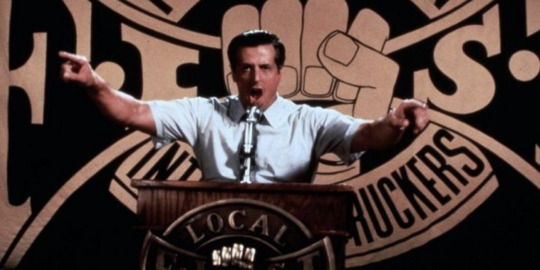
But it was also the year of Paul Verhoeven’s Basic Instinct, the sine qua non of Eszterhas-penned films. And if Sharon Stone’s lascivious leg-cross (Verhoeven’s invention, incidentally, not Eszterhas’) provided posterity with the most iconic upskirt of a blonde in a white dress since Marilyn Monroe’s encounter with a subway grate, that is largely all that remains to us of it today. Well, that and the instantly forgotten sequel (sans Eszterhasian involvement) that already seemed wildly anachronistic in 2006. The original film, its writer, the erotic thriller genre it exemplified, the dunderheaded sexual politics it upheld while attempting to subvert, the whole idea of a mainstream screenwriter having a brand at all (even one as loosely defined as “writer of films you don’t tell your parents you snuck into”), all seem like ancient relics. These are the artifacts not only of a bygone age but of an extinct genus, a whole evolutionary branch that was nipped in the bud so comprehensively that even now scientists might argue over how closely the skeletons of certain bird species resemble the bones of Basic Instinct.
This containment, however, is what makes looking back at the Eszterhas era so fascinating. His brief Hollywood hegemony is a microcosmic event in cinematic history, one with a beginning, middle, and an end (barring some late-breaking epilogue, or a post fade-to-black pan down to an ice pick under the bed). And it didn’t start with his first produced screenplay, for the leaden Sylvester Stallone truckers-union drama F.I.S.T. (Norman Jewison, 1978), although the glimmer of future feats of financial alchemy was already present in the reported $400,000 he received for the novelization. Dawn really broke for Eszterhas, as it did for three of the only other people who could legitimately be termed his peers as purveyors of massively popular, high-concept, low-brow ‘80s sensationalism (producers Don Simpson and Jerry Bruckheimer, director Adrian Lyne), with 1983’s Flashdance.
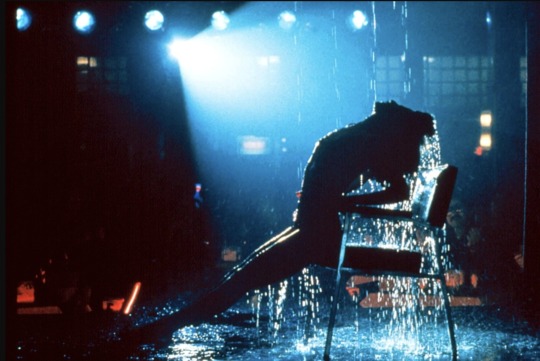
It was an improbable success, less a film than an aerobics video occasionally interrupted by some awkward sassy banter and Jennifer Beals’ popping-flashbulb smile. Its vanishingly thin story, which Eszterhas co-wrote, is of an 18-year-old welder in a steel mill, who moonlights as an exotic dancer while aspiring to become a ballerina—a logline that sounds like a hoot of derision even as an unadorned description—and is full of Eszterhasian hallmarks. There’s the high degree of preposterousness. There’s the gym scene, during which the ladies of the cast grimace and lift weights in full makeup, and while here the frictionless unreality of Lyne’s TV-commerical aesthetic makes the sequence abstract, the peculiar faith in the erotic potential of a workout would recur in the squash sequence in Jagged Edge (Richard Marqund, 1985) and the ludicrous gym date in Sliver (Phillip Noyce, 1993).
And Flashdance also prefigures almost the entire Eszterhas oeuvre in being a story that centers on a woman’s experience and that laudably—if here laughably—positions her career ambitions as at least equal to her romantic aspirations in the mechanism of the plot. But, as elsewhere, it’s a view of women constructed by a proudly unreconstructed man, directed and photographed by men. (Eszterhas’ hard-drinking, womanizing, hellraising, Hunter S. Thompson-of-the-movies persona is enjoyably self-mythologized in his memoir Hollywood Animal.) If anything, what comes across most strongly in Eszterhas’ conception of a “strong woman” is his bafflement when tasked with imagining what such a woman might have going on inside her brain. His filmography may be full of female-fronted titles, and may contain the most famous mons venus in film history, but most of Eszterhas’ work could not be more male gaze-y f it were written from the point of view of an actual phallus, like the closing chapter of his 2000 book American Rhapsody, which is narrated by Bill Clinton's penis, Willard (I am not making this up).
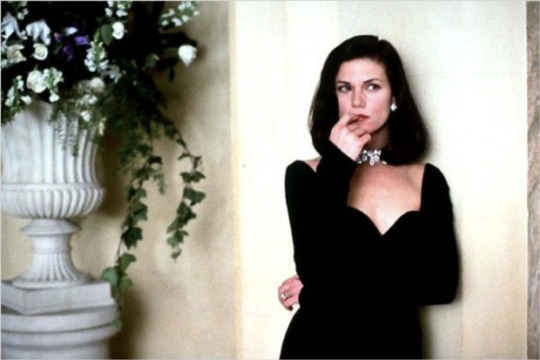
This powerfully eroticized dissociation, this sexualized incomprehension of women as people with interior lives, is the animating idea behind the most Eszterhasian of Eszterhas scripts. But it’s a blank space in which directors, and especially actresses, could sometimes find room to create for themselves. Sharon Stone is genuinely, in-on-the-joke fantastic in Basic Instinct—who else could have delivered “What are you going to do, charge me with smoking?” as if it were an unreturnable Wildean riposte? Costa-Gavras’ Music Box (1989) is by some distance the sturdiest and least dated of Eszterhas movies, a lot due to its comparative sexlessness, but also because of a great, warm, real performance from an Oscar-nominated Jessica Lange. Debra Winger just about wins out in her more thankless role in Costa-Gavras’ first Eszterhas collaboration, Betrayed (1988). And Glenn Close imbues the heroine of the superior thriller Jagged Edge with such shrewdness that it’s almost a liability to the believability of the central deception.
But live by the sword, die by the sword, and when the director/actress combo fails to operate in similar sympathy we get Stone horribly miscast as a… sexy wallflower?… in Sliver, or Linda Fiorentino visibly flailing as a… downtrodden femme fatale?… in Jade, or poor Elizabeth Berkley thrashing wildly about in the neon-lit swimming pool of kitsch that is Showgirls. In these failures, the writer’s almost panicky vision of women as vast, dangerous cognitive black holes is best revealed. But then, mistrust of the opposite sex is only one aspect of the wider mystery that underpins even Eszterhas’ outlier titles: his entire output is preoccupied with how little any of us can ever know anyone.
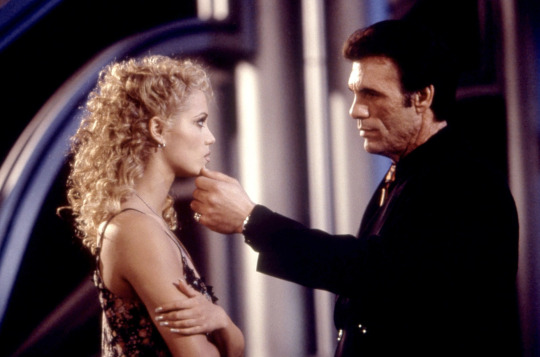
In Eszterhas’ semi-autobiographical Telling Lies In America (Guy Ferland, 1997), a teenage Hungarian immigrant (Brad Renfro) is dazzled by Kevin Bacon's smooth-talking DJ, but blindly unable to work out if he is friend or fiend. Music Box details a lawyer’s dawning disillusionment over her adored father's murderous past—eerily mirroring Eszterhas’ discovery of his own father’s collaboration with the Hungarian Nazi regime. Betrayed has Winger’s FBI agent falling for Tom Berenger’s farmer only to discover he is, in fact, the neo-Nazi she insisted to her bosses he was not, in similar vein to Jagged Edge, in which Close’s lawyer discovers that the lover she successfully defended actually dunnit after all.
Oftentimes, the credulity-stretching ambivalence of these characters is all that powers the suspense, as in the is-she-gonna-kill-him-or-is-she-just-orgasming moments in Basic Instinct. In the misbegotten Nowhere to Run (Robert Harmon, 1993) Jean-Claude Van Damme plays a ruthless ex-con turned valiant protector, his blockish inertia apparently meant to signal that inner ambiguity. More often, it leads to final-act fake-out twists so unmoored to anything like recognizable motivation that they become weirdly weightless, as in Sliver when Stone’s Carly does not know if she’s killed the right man until the final four seconds of the film, and where, had the coin-flip gone the other way, it would still be equally (un)believable.

If it’s part of the egotistical remit of the writer to believe they have an insight into human psychology, it’s remarkable how much of Eszterhas’ oeuvre pivots around how fundamentally unknowable people are to one another. And while that schtick, by which you can’t tell if someone cares for you or is simply a talented sociopathic mimic, resonated briefly at the exact moment when the grasping, solipsistic ‘80s were segueing into the untrustworthy, PR-managed ‘90s, it proved not to have much long-game sustain. Critics had always been sniffy about Eszterhas, who clearly mopped up his tears with massive wads of 100 dollar bills. But when audiences started staying away, like in the Showgirls and Jade-blighted annus horribilis of 1995, the inflationary bubble that allowed Eszterhas to command millions for two-page outlines scribbled, one suspects, on the back of strip club napkins, abruptly burst. The idea of screenwriter-as-auteur, or rather as reliable bellwether of commercial success, proved a fallacy, an expensive experiment that began and ended with Joe Eszterhas, its earliest progenitor, luckiest beneficiary, and biggest casualty.
Glossy, vacuous, adult-themed thrillers were not the only thing going on in Hollywood, and Eszterhas was not the only big-name screenwriter. Shane Black, writer of Lethal Weapon, also commanded astronomical sums for his early ‘90s scripts, but the key difference is that Black wrote in the register of the franchise-able action-spectacular blockbuster that would eventually trounce all others as the Hollywood model for the future. Black has gone on to become part of the Marvel machine as a writer and director, while aside from one Hungarian-language period film, Children of Glory (Krisztina Goda, 2006), Eszterhas’ contribution to the pop cultural landscape post-2000 has been in the form of self-aggrandizing memoirs, or highly public fallings-out with celebrities, like Mel Gibson, of a similarly corked vintage.

The tastemaker point of view has historically been to consider Eszterhas among the worst things that ever happened to Hollywood—so much so that disdain-dripping sarcasm seems to be the fallback for critics summarizing his impact. But while no one is going to make the case for the man’s filmography as some sort of artistic landmark, the Eszterhas era did represent one of the last gasps of a Hollywood that believed, however misguidedly, in personality over product, when the idiosyncrasies, idiocies and ideologies of a single person—a writer at that—could, with studio backing and a 1,500 theater release strategy, influence the cinematic development of an entire generation. That might not have seemed like a good thing but retrospect, like cocaine, is a helluva drug and in 2019, with blandly anonymous, market-tested content churned out by mega-corporations bi-weekly to siphon your hard-earneds away, the kind of salacious tackiness Eszterhas represented feels oddly adorable, even quaint. Now that singular talents—even the obnoxious and objectionable ones—who could make decent returns on mid-budget, adult-oriented mainstream fare, have been steamrollered by infantilizing, monolithic billion-dollar mega-franchises, it’s hard not to be a little nostalgic for the vanished hiccup of time when Hollywood briefly uncrossed its legs for Joe Eszterhas, and Joe Eszterhas told us all what he saw.

24 notes
·
View notes
Photo





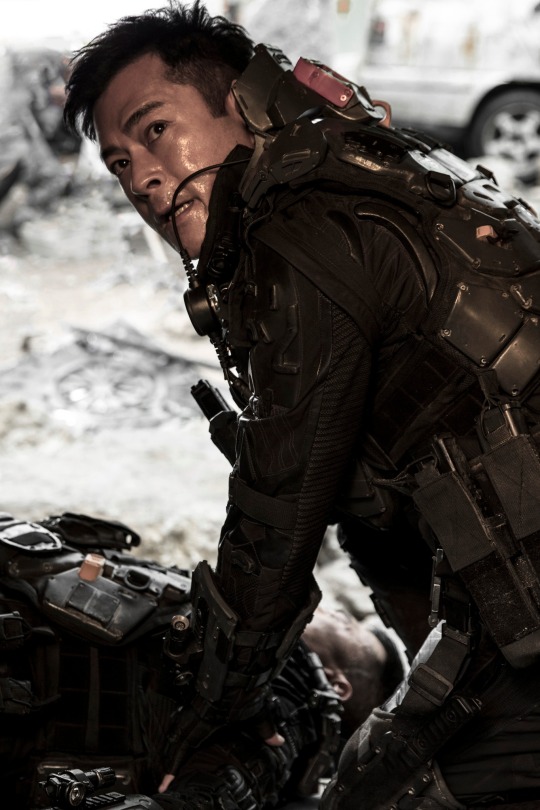




“As Long As There Is Money Being Invested In Hong Kong Films And We Can Keep People In The Industry Not To Change Jobs, Our Hopes And Dreams Will Not Be Sabotaged!” The Great Actor And Producer Louis Koo(古天樂)’s New Mind-blowing Tech Film Warriors of Future
A great man is different from a mere celebrity in that he is ready to be servant of the society.
Triumphant success is achieved by those who know frustration is unavoidable but work illogically hard. They want to accomplish for themselves and other people. They want to leave some good things behind, both during their lifetime and posthumously. My old friend Louis Koo (古天樂) is such a hero in the film industry of Hong Kong. He is a very handsome man, remarkable actor, prolific producer and generous investor. He even takes up leadership responsibilities in film organisations such as Hong Kong Performing Artistes Guild(香港演藝人協會) and Federation of Hong Kong Filmmakers(香港電影工作者總會). What he does not know or does not want to know is perhaps that happiness consists of getting enough sleep.
I guess this guy probably sleeps 4 hours a day but still untired—so long as film can fill up his time. When the sun is overhead, he is occupied with shooting, meetings, running his film production and post-production companies, cursory PR activities and filming commercials for clients. When the moon lights up the sky, Louis has dinners with film investors, reads scripts or proposals and solves problems for other film professionals. Anxiety and stress? Exhaustion? Headache? This superstar surely has feelings of burnout but Louis Koo faces it bravely alone. He is ordinarily reticent because he does not wish his dread to stir anyone.
What I have is a malevolent curiosity. I once asked Louis, “Isn’t it wiser for you spend money on something else? Film is a risky business.” He, as usual, prudently replied, “I made a great living by what I got from the film industry and Hong Kong. I get more and I want to give more too. It is my sense of duty to put back into the film industry and Hong Kong the equivalent of what I took, in fact too much, out of it.”
This year, Louis made a major breakthrough in Hong Kong film genres—no more gangster movie for Hong Kong! His newly produced work is Warriors of Future (明日戰記) which is a science fiction thriller, though filled with typical characters and clunky dialogue, has been immensely entertaining because of its spectacular visuals and ample special effects. This quintessential Hong Kong blockbuster is packed with non-stop action and popping fight. The effort will only be meant as a starting point for inspiring more such Hong Kong films to come if this new genre that employs technology and digital instruments can prove to be of attractive commercial returns to the investors. When I watched the film in a local district Chai Wan, I saw families all over the cinema. Shouts and laughter were everywhere. They came to support Louis Koo, the superstar who now stands for the spirit of Hong Kong! They will not let the spirit be destroyed.
Life is like a sandwich. Success in one slice of bread and failure is the other. What Louis has put in-between the slices is his belief about the immortality of films of Hong Kong—the forgotten ‘Hollywood of the Far East’. Louis said, “As long as there is money being invested in Hong Kong films and we can keep people in the industry not to change jobs, our hopes and dreams will not be sabotaged!”
In case of any interest to support films, I am pleased to refer. We are all very thankful to great ones like Louis Koo for contributions to Hong Kong. I am always fascinated by the power of perseverance of Louis. He was a boy. He is a man. He will be a hero.
MLee
Chinese Version 中文版: https://www.patreon.com/posts/wo-yan-zhong-duo-71295554?utm_medium=clipboard_copy&utm_source=copyLink&utm_campaign=postshare_creator
“Warriors of Future” Movie Trailer https://youtu.be/WCW18rGjIvM Acknowledgement-One Cool Film
The making of “Warriors of Future” https://youtu.be/0MInzsJWHQk Acknowledgement-One Cool Film
“Warriors of Future” Movie Song https://youtu.be/uw6VB-xAdhA Acknowledgement-One Cool Film
“Warriors of Future” – Interview of Sean Lau and Louis Koo https://youtu.be/Ckhc3Omset8 Acknowledgement-am730
Louis Koo and his figures https://youtu.be/o8Kf_b4ASaM Acknowledgement-nikeyli
#Hong Kong Films#Blockbuster#Popping#Hong Kong Performing Artistes Guild#Federation Of Hong Kong Filmmakers#Science Fiction Thriller#Hollywood Of The Far East#Gangster Movie#Digital Instruments
0 notes